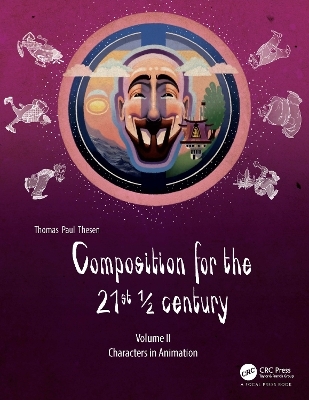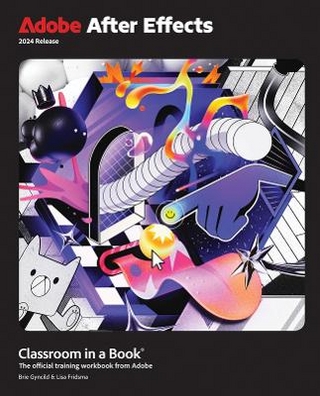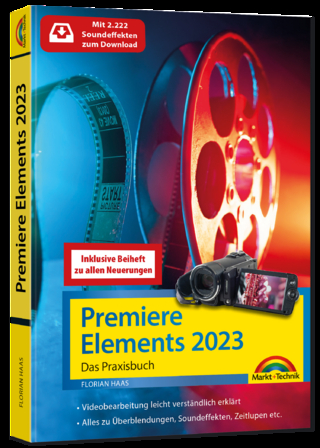
Composition for the 21st ½ century, Vol 2
CRC Press (Verlag)
978-1-138-74094-5 (ISBN)
Composition for the 21st ½ century: Characters in Animation focuses on characters and their application in animation, illustration, games, and films. It covers various technical aspects of character design and their artistic applicability. This book analyzes in detail the purpose of these character design features and provides examples of their impact. Emphasis is placed on each aspect and how it affects and is affected by the narrative. Additionally, complex case studies that assist in explaining the successful use of these concepts in films and animation are included. This book is geared toward students; however, it is also reader-friendly for professionals. Composition for the 21st ½ century: Characters in Animation’s goal is to comprehend composition as an artistic tool and as a significant part of the professional character design process.
Key Features:
Teaches the complexity of composition in the professional character design process.
Closes the gap between praxis and theory in character design.
Explains how to produce believable characters that express their narrative in the visuals.
Discusses the need for artistic reasoning in character design.
Presents case studies to assist readers in understanding the process as they progress through this book.
Author Bio:
For more than twenty years, Thomas Paul Thesen’s career has been about learning and understanding the complexities of art, animation, and image-making, both in still illustration, drawing, and photography and in the moving image. He has worked in the industry as a character animator and visual development artist for companies such as Pixar, DreamWorks, and Sprite Animation Studios. He has also taught for many years at universities across Asia, the USA, and the UK.
Thomas Paul Thesen has spent six years in studying illustration at the University for Applied Sciences in Hamburg, Germany and then got his Master of Fine Arts in Experimental Animation at CalArts in California. During his studies he was approached by Pixar Animation Studios to do inspirational character development on their feature film Ratatouille. After getting his MFA from CalArts he started to work as a character-animator for Dreamworks Animation and worked on the feature Shrek 2. He always wanted to go into visual development and switched departments to work on features like Bee-Movie or Puss-in-Boots. Since then he has been focusing on visual development, character design and illustration in his professional and freelance work. For eight years now he has been teaching animation for universities like NYU Tisch Asia, Hongik University or Hallam University and others.
Chapter 1: The Job of a Character Designer
Chapter 2: Visual Development Process
Chapter 3: Storytelling and Drama
Chapter 4: Personality
Chapter 5: Relationships
Chapter 6: Emotions
Chapter 7: Message or Theme
Chapter 8: Research and Concept
Chapter 9: Design Scale
Chapter 10: Pose and Communication
Chapter 11: Thumbnail Drawings
Chapter 12: Shape
Chapter 13: Form
Chapter 14: Line of Action
Chapter 15: Anatomy
Chapter 16: Weight
Chapter 17: Tension and Compression
Chapter 18: Contrapposto
Chapter 19: Movement and Twist
Chapter 20: Pivot Point
Chapter 21: Balance and Tension
Chapter 22: Silhouette
Chapter 23: Perspective and Dimensionality
Chapter 24: Foreshortening
Chapter 25: Tangents
Chapter 26: Light and Shadow
Chapter 27: Vectors and Directions
Chapter 28: Facial Expressions
Chapter 29: Extroverted and Introverted Pose
Chapter 30: Negative and Positive Space
Chapter 31: Body Ratio
Chapter 32: Contrast
Chapter 33: Texture
Chapter 34: Line Quality
Chapter 35: Simplicity and Readability
Chapter 36: Believability
Chapter 37: Color Design
Chapter 38: Clothing Design, Folds, and Fabrics
Chapter 39: Style Pass
Chapter 40: Character / Model Sheets
Chapter 41: Refinement
| Erscheinungsdatum | 02.08.2019 |
|---|---|
| Verlagsort | London |
| Sprache | englisch |
| Maße | 216 x 280 mm |
| Gewicht | 1424 g |
| Themenwelt | Informatik ► Grafik / Design ► Film- / Video-Bearbeitung |
| ISBN-10 | 1-138-74094-2 / 1138740942 |
| ISBN-13 | 978-1-138-74094-5 / 9781138740945 |
| Zustand | Neuware |
| Informationen gemäß Produktsicherheitsverordnung (GPSR) | |
| Haben Sie eine Frage zum Produkt? |
aus dem Bereich


